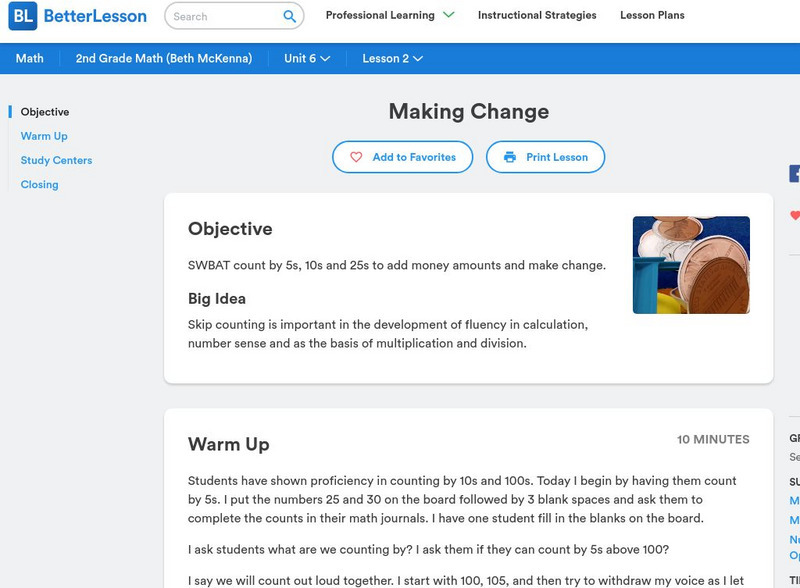Hi, what do you want to do?
Curated OER
Aluminum Altruism
Students explore the value of recycling. They consider the importance of giving back to their school community. They calculate their earnings using multiplication and addition.
Curated OER
U.S. Population Hits 300 Million
Students read a story about the population in the United States reaching 300 million, and answer vocabulary and comprehension questions about it. In this population lesson plan, student respond to literature by answering questions,...
Curated OER
Non-Western Economic Values
Students engage in a game of economic exchange that present a variety of perspectives on wealth. They read scenarios and write a journal response to the scenario. They discuss how we use money in the Western culture and discuss how...
Curated OER
Figuring Elapsed Time
Students discover the concept of elapsed time. In this calculating time lesson plan, students utilize the Internet to complete record sheets based on the concept of elapsed time. Finally, the students answer questions on their own.
Curated OER
Tallest Stack Wins
Students build a stack of pennies as tall as possible, recording the number of pennies they are able to stack before the tower falls. Then, sharing answers, they determine the average number of pennies that could be stacked.
Curated OER
Rate Your Family's Plate
Students examine their family's eating habits. For this adult health lesson, students share what they think from the survey facts presented to them. They set a goal for their family's health.
Curated OER
Problem Solving
Scholars will learn to solve word problems using addition, subtraction, multiplication or division. Using a grocery store theme, they will identify the best way to solve real-life problems. There are many ways this basic lesson can be...
Curated OER
Operations with Decimals
Help your learners get practice with operations involving decimals. They will follow prescribed steps that require them to use mixed operations to solve problems with decimals. Great for practice after pupils have had comprehensive...
Curated OER
The Industrial Revolution
Eighth graders examine the time period of the Industrial revolution in American history. In this American History lesson, 8th graders read the chapter on this time period. Students create a presentation on this time period to...
Curated OER
Ask Not What Your Government Can Do For You...Why Not?
Students explore tax incentives that are available for businesses to locate or expand their operations. They discuss reasons entrepreneurs should be aware of the governmental incentives that are available.
Curated OER
Handling Data: Probability, Chase Me game
Students participate in a simulation in which the aim is for the tortoise to catch up with the hare or vice versa. Moves are decided by throwing two dice. Adding together the numbers on the two dice tells you which animal moves one...
Curated OER
The Whole World in Our Hands
Students discover the concept of "tikkun olam," or "repairing the world." In this service learning lesson, students identify skills that they possess which may be used to help those in need.
Curated OER
More Bait for Your Buck!
Students determine where to buy the heaviest earthworms as they study invertebrates. They create a double bar graph of the results of the weight data.
Curated OER
Math Lesson Study Plan
Second graders find missing addends by solving math word problems. In this missing addend lesson, 2nd graders work in a whole group setting to find the missing addends in word problems before using the strategies to work independently....
Curated OER
Reading
Third graders read the book Ghosts Don't Eat Potato Chips. In groups, 3rd graders answer questions about the story. They share their personal responses. Students write answers to some questions.
Curated OER
The Drag of Drag
Students are introduced to drag. Then they summarize drag by saying that the drag is proportional to the square of the velocity. Students then solve problems an example of such a problem: Explain why swimming underwater is faster than...
Curated OER
Probability or Ability?
Students fill in a probability chart while attempting to catch candy with their non-dominant hands. They replicate the activity with a coin.
Curated OER
Collaborative Projects: Have Your Say
Students imagine they are a member of their local council in Australia. Students have role play the consideration of information given to Council, then vote for or against approving applications.
Better Lesson
Better Lesson: Making Change
Second graders count by 5s, 10s and 25s to add money amounts and make change.
Other
Nearpod: Making Change
For this lesson on making change, 2nd graders learn key vocabulary, explore skip counting on number lines, and apply their learning to a real-world scenario.
Alabama Learning Exchange
Alex: I'm Into Money!!!
Many students come to third grade needing to review and/or be retaught counting money and making change. This lesson will begin with a review of counting money. It will then introduce making change.This lesson plan was created as a...
Better Lesson
Better Lesson: Making Change Using Partners of One Hundred
Using dimes to make change is another way to work with subtracting tens within 100.
Crayola
Crayola: Money in the Bank
Young bankers and storekeepers practice counting money and making change. They keep their money in this recycled-box bank.
University of Regina (Canada)
University of Regina: Math Central: Lesson Plan: Money, Money, Money
It all about money! Explore the concept of money in this real-world, unit plan. A collection of six lessons where students practice skills such as coin identification, mental math, menu math, making change, math operations with coins,...


























